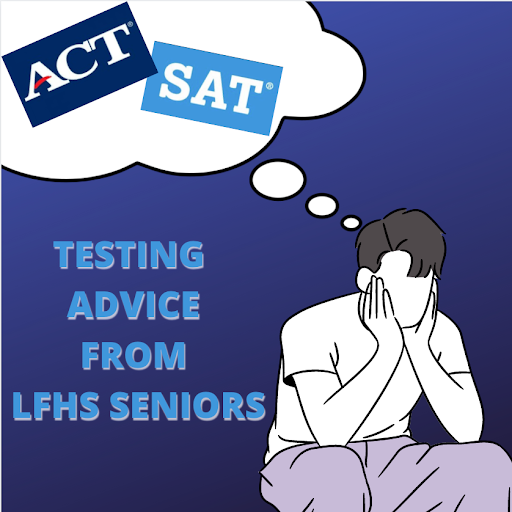ACT/SAT Advice From Seniors

December 3, 2021
According to Fair Test, 75% of colleges in the United States went test-optional for the 2021 application cycle. Although the majority of these schools are planning on staying test-optional, scoring high on the SAT or ACT is a helpful tool to keep in your back pocket when applying to college.
I took the ACT a painful four times and the SAT once. I was tutored for months and studied religiously, filling out a practice ACT every Sunday before the test date. At first receiving a lower score than expected, I was disappointed and discouraged.
It was tempting to only apply to test-optional schools, but for me (as for many others), two of my favorite schools required test scores, so I took it again… and again, and again. There was no better feeling than getting the last score back and deciding I was finally done with the ACT for good.
Juniors are now starting to take these tests, preparing themselves early, knowing that they may have to take it more times than desired.
I know I am not alone when saying that I learned many valuable tips and tricks along my ACT journey, so juniors, you’re in luck.
Here is advice from seniors regarding the ACT or SAT:
“Study on your own before you get a tutor,” senior Jacqueline Rubin said. “If you have the opportunity, take a test on your own so you can gauge how much work you need to do.”
Senior James Bentley said, “Don’t be afraid to retake the tests. It can get tiring, but I regret not taking it one more time.”
Senior Abby Hanlon said, “The test score doesn’t define who you are, it’s really all mental. If you stress and overthink it, you won’t get the score you want.”
“Make sure you get a good night’s rest before the tests,” senior Joey Nassar said. “Also, don’t drink too much caffeine before because I did one time, and I crashed mid-way through.”
Senior Emily Chabraja said, “Test scores aren’t as important as people make them out to be. So many schools will still be test-optional, and they are great options if your test score isn’t as high as you want.”
“The thing that benefitted me the most was getting a couple of different ACT practice books and doing at least one full test a week leading up to the test date,” senior Lyla Walsh said. “It’s so helpful because you can check over the answers you got wrong and you know you won’t get them wrong come to the actual test.”
“Use the process of elimination for each question. It depends on the section, but for English and Reading you can eliminate answers for everything,” said senior Scott Seaman. “Make sure you can back up your answers with a line from the reading.”
Senior Katie Gildersleeve said, “Taking the test section by section is so important. If you don’t feel good about the first section, don’t let that influence the next few. This will help you if the schools you apply to take the ACT Superscore.”
Senior Thibault Sacherer said, “It’s easy to zone out on the reading section, but what I found that helps is re-reading the very first paragraph of the passages. It’ll almost always tell you the main idea.”
“Don’t put so much pressure on yourself,” said senior Isabella Kohout. “I would also suggest taking the class at the high school for the SAT, it’s free and super helpful.”
“If you have the opportunity, get a tutor,” senior Cat Morris said. “It really helped me, but you also have to remember there are so many other things colleges look at. Don’t put all of your focus on the SAT or ACT, do community service, study, and join clubs.”













